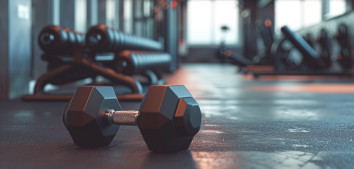
Muscle Memory
We all know very well how the little sins we indulge ourselves with over winter can delay our New Year resolutions. Some forgotten chocolates and the “need” to finish all the leftovers from the fridge before starting a proper diet are not helpful either 🙂 We look at ourselves in the mirror in disbelief and think how come we have done that?
Have my efforts gone to waste?
I have good news, all is not lost! Regular physical activity leads to muscle memory, which means that even after a long break we will return to the form we had before holidays faster than if we had just started our adventure with sport. Depending on the training experience, the length of the break and the reason for stopping, return will be difficult and muscle aches are inevitable, but the first effects will appear surprisingly quickly.
Truth hidden in cells
Myocytes, i.e. muscle cells, increase their volume under the influence of physical activity and the supply of nutrients. Thus, the number of cell nuclei increases and the production of muscle proteins is improved. Two processes are crucial here. The first is tissue hypertrophy as a result of enlargement of individual cells, without increasing their number. The second is atrophy, which is a decrease in the volume of the cell or tissue.
If you stop regular training, muscle mass decreases and myocytes shrink, but do not disappear. Due to the presence of cell nuclei and the associated muscle memory, muscle cells retain the ability to grow rapidly and can quickly return to their earlier size. We know many reasons for break in physical activity (injury, vacation, pregnancy), but regardless of them, muscle strength decreases after about 2-4 weeks. Fortunately, recovery can be seen after just a few training sessions.

Additional benefits of muscle memory
Muscle memory is also a process of remembering motor skills by our nervous system. When you repeat exercises, the work of synapses in the muscles improves, which increases the speed at which impulses travel from the brain through the nervous system to the muscles. The quality of the exercise, not the number of repetitions, plays a key role in this process. I often remind you that it is much more important, especially at the beginning, to concentrate during your workout and to perform exercises slowly and without rush. Appropriate concentration during exercise has a very good effect on the smoothness and speed of muscle work. If we think only about the number of repetitions, then we do the exercises carelessly and such a model is recorded in muscle memory. It is difficult to correct bad habits and moves and it requires persistent work and conscious effort to “program” the correct training model in muscle memory.
Muscle memory training
In order to train your muscle memory in the right direction, start each workout with a proper warm-up. A good start will prepare your muscles for more intense effort and increasing fatigue. The muscles will then reproduce the learned, correctly performed movement.
Muscle memory is also an ally of moms-to-be. For the sake of our baby’s health, we have to refrain from intensive training. But once we’ve returned to physical activity, we will regain good physical condition much faster 🙂
A few tips:
- Try and repeat – performing exercise repeatedly beats the path of movement and will improve the muscular-neural connections
- Stay focused – effectiveness is affected by the quality of training, think about every move you make
- The devil is in the detail – each movement consists of many phases involving individual muscle parts. If you skip a workout, resume it from training the appropriate body part
Remember!
I would like to remind experienced athletes that they will not have to wait long for the first results when return to the training regime, and beginners must remember that the accuracy of their exercise is the key to success.
See you at the gym! 🙂
Bibliography:
- Bruusgaard J. C., Johansen I. B., Egner I. M., Rana Z. A., and Gundersen K.. Myonuclei acquired by overload exercise precede hypertrophy and are not lost on detraining. Department of Molecular Biosciences, University of Oslo, Norway, 2010.
- Mleko S., Pamięć mięśniowa, hiperplazja. Pamięć, czy mit?, KiF 1/2010









Comments No Comments
Join the discussion…